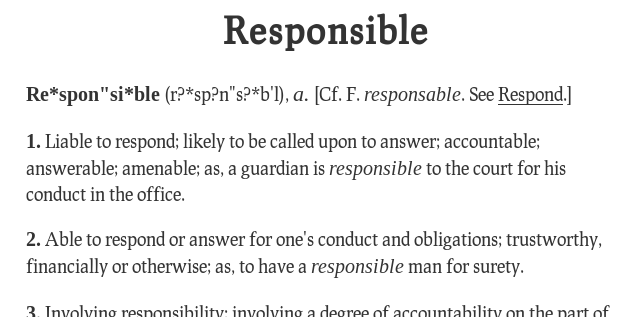
If I walked into the room to teach my youth karate class, found a mess, and asked my students, "Who is responsible for this?", they would probably think I was trying to find out who to blame. Whose fault was it that this had occurred? We often think of words like "blame" when the word "responsibility" comes up.
But there's another sense of the word which is right there in the pronunciation, if not in the English spelling: "response-able". Indeed the word comes to us French "responsable", and the 1913 Websters gives one definition as "Able to respond or answer for one's conduct". We can trace it back to the Latin "spondeō" meaning "I promise, bind or pledge myself."
"Making a promise", "able to respond." That sounds much more positive than "blame" or "fault". We don't have to be to blame for a situation in order to take responsibility for it. A doctor isn't to blame for a patient's illness, a fire fighter isn't to blame for the fire; yet they are willing to make a promise to do something about these situations, they are able to respond and try to make things better. It doesn't have to be something that dramatic -- picking up trash someone else threw on the street is a response to that situation.
As we continue our training, we strengthen our ability to respond to circumstances. Responding to physical violence is part of that, of course; if your martial arts training doesn't enhance your ability to respond to bullying and threats and physical intimidation, ipso facto you're not really doing martial arts training. (That doesn't mean you should be perfect at it or invulnerable or foolhardy, it means you should be better able to deal with the situation than you would be without training.) But with a little luck the question won't come up for most of us, at least for us middle-class Americans.
But our training should also be helping us to develop emotional calmness, strength of character, determination, general physical fitness, and other attributes that will help us to respond in a wide variety of situations.
In other words, it should be making us more response-able.
So I would hope that if some new kid in class were to knock over a bunch of stuff and make a mess, the more senior kids would respond to the situation by cleaning it up. And if one of my older students were to encounter a messy situation somewhere, at work or in life, I hope that they would display the ability to respond appropriately and effectively.
And if you feel like you can't take responsibly for something, I suggest you ask yourself what is preventing you from being able to respond? Of course we can't effectively respond to everything; some situations take specialized skills or require resources that we may not have access to. But when we realize what's missing from our toolbox or bag of supplies we can then consider improving those things and preparing fro next time.
That's not to say we have to be fully responsible for everything. We specialize for a reason. I have a pretty good set of home maintenance tools, but I don't own a torque wrench or a table saw or a jackhammer or an arc welder. I call in people with special skills if I encounter a situation where these are needed.
But even getting the right help is a useful response to a situation, as opposed to doing nothing. If my hypothetical young responsible student couldn't reach a shelf to put something away, for example, there's no shame in asking someone taller to help.
And that can be a hard thing! To put away ego and ask for help to deal with something can be a very challenging way to be responsible.